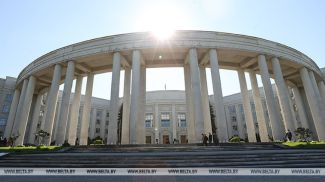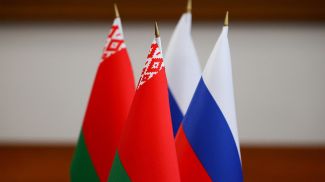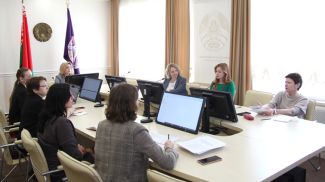MINSK, 20 June (BelTA) – A lot of work has been done in Belarus to optimize regulatory requirements for entrepreneurship. Prime Minister of Belarus Andrei Kobyakov made the statement during the session of the Council of Ministers' Presidium on 20 June, BelTA has learned. The session was held to discuss results of the work on simplifying business operation terms and ruling out excessive requirements for private companies.
Andrei Kobyakov reminded that in January 2017 the head of state gave instructions to remove the barriers that impede the operation of private companies and to work out presidential-level legislation to stipulate minimal sufficient requirements for the operation of private companies. A working group led by the head of the Belarus President Administration was set up in order to fulfill the president's instructions.
Andrei Kobyakov said that large-scale and systemic work to determine approaches to optimizing the regulatory requirements for private business and for auditing had been done since then. The work resulted in a package of draft legal acts meant to liberate the business initiatives in various spheres.
The package includes draft presidential decisions on entrepreneurship development and ruling out excessive requirements for private business; decisions on reducing the number of activities that need licenses; decisions on enabling conditions conducive to the development of trade, public catering, consumer services; on improving oversight and auditing; on introducing tax consultancy; on additional measures to encourage the development of individual types of entrepreneurship such as agroecotourism, arts and crafts.
According to Andrei Kobyakov, the key document is the draft presidential decree on encouraging entrepreneurship development and ruling out excessive requirements for private business. The draft decree provides for radically changing the mechanism of interaction between the state and the private sector. Andrei Kobyakov explained: “The main purpose of the draft decree is to leave a minimal set of direct-action regulations. The other norms will be recommendatory and act as guidelines for private companies.”
Andrei Kobyakov said that the number of mandatory sanitary and epidemiologic requirements, environmental protection requirements, and requirements concerning animal health and other spheres will be considerably reduced. The administrative barriers involving complicated and lengthy procedures, letters of verification, approvals, and other kinds of permit documents will be pruned as much as possible.
The draft decree lays down such approaches as, for instance, notification procedures for starting several most popular kinds of business operations. The list includes consumer services, tourism, social services, retail and public catering, passenger transportation and baggage transportation (the non-regular kind), manufacturing of agricultural products, construction materials, and other popular kinds.
According to the Economy Ministry, some 95% of Belarusian small and medium private companies pursue these types of commercial activities. In order to start a career in these kinds of commercial entities, Belarusians will only have to notify their respective municipal government agency via the one-stop window service or via the united web portal for digital services. The person will be able to carry out the specified kind of commercial operations the next day.
There are plans to come up with general fire safety requirements, sanitary and epidemiologic requirements, and environmental protection requirements for the placement, design, equipment, and maintenance of capital structures. The existing 586 fire safety rules, seven addenda and 13 tables will be distilled into 58 rules. The massive stratum of sanitary requirements for business operation — 14 documents with over 1,100 rules — has been reduced to 95 rules.
The administrative barriers involving complicated and lengthy administrative procedures, acquisition of letters of verification, approvals and other kinds of permits will be phased out as much as possible. For instance, there are plans to drop transport manifests in transportation by road except for regular transportation services.
As far as civil engineering is concerned, the commissioning of buildings will be greatly simplified. Instead of getting approvals from the Emergencies Ministry divisions, sanitary services, and other government agencies a commercial entity will have to submit a set of documents to the respective municipal government agency via the one-stop window service. The documents will go through all the approval steps on their own as part of one complicated administrative procedure and a decision will be made within a month.
At last, the package of documents provides for introducing a moratorium on introducing new taxes and raising tax rates in 2018-2020.
All in all, the draft decree is designed to minimize the state interference with the operation of commercial entities. While the government is ready to give more leeway to private companies, businessmen themselves will have to bear responsibility for the quality and safety of their products and services, concluded the prime minister.
Participants of the session of the Council of Ministers' Presidium also discussed the draft presidential decree on reducing the number of licensable services. For instance, proposals have been made to drop licensing for advocacy and the provision of legal services, provision of psychiatric assistance, printing services. “Many of the types of business are closely connected with the safety, life, and health of Belarusians. This is why today we will have to once again weigh all the pros and cons in order to work out a truly balanced decision,” stated Andrei Kobyakov.
Apart from that, a draft decree on enabling conditions conducive to the development of trade, public catering, and consumer services was discussed. The document was developed by the Antimonopoly Regulation and Trade Ministry. The document introduces innovations in the organization of retail trade, public catering, and consumer services in localities populated by at most 20,000 people. “As far as tax consultancy is concerned, the developers fully understand the need to introduce such an institution in Belarus. Particularly for the sake of developing small business, which, due to its nature, often requires additional professional advice to protect its interests,” said the head of government.
“The purpose of today's discussion is to determine how well the prepared draft documents can fulfill the head of state's instruction on radically reducing the barriers that impede the private sector,” concluded Andrei Kobyakov.











